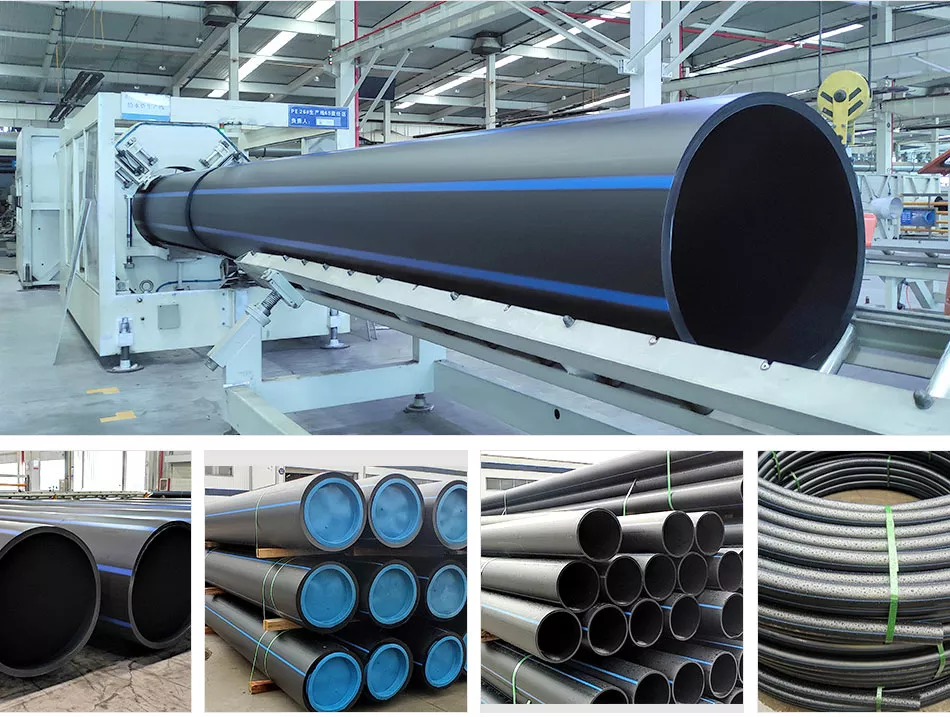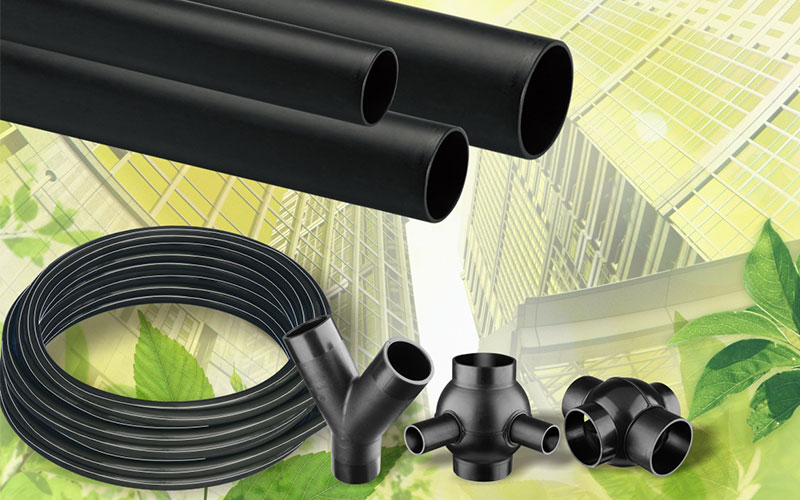Texas hdpe pipe manufacturer: Green Manufacturing
Recognizing the Secret Benefits of HDPE Pipe for Water and Wastewater Monitoring
Making use of HDPE pipe in water and wastewater management provides numerous benefits that warrant factor to consider. Its extraordinary toughness and long life expectancy make it a favored choice for lots of tasks. Additionally, the product's resistance to corrosion and chemical damages enhances its integrity in different settings. The benefits extend past simply durability and resistance. Midland TX HDPE Pipe Fittings in Stock. Exploring its cost-effectiveness and ecological influence exposes even a lot more compelling factors for its widespread adoption in modern-day facilities
Remarkable Sturdiness and Long Life

HDPE pipe stands apart for its remarkable sturdiness and long life, making it a preferred selection in water monitoring systems. Built from high-density polyethylene, these pipelines can hold up against considerable stress and stress, making certain trusted performance in time. Their robust nature enables them to withstand severe environmental problems, including temperature changes and dirt motions, which can create various other products to stop working.
The life expectancy of HDPE pipelines usually goes beyond 50 years, offering a cost-effective remedy for towns and industries alike. In addition, the product's light-weight residential or commercial properties simplify setup, minimizing labor costs and durations. This toughness decreases the need for frequent repairs or replacements, additionally enhancing its economic appeal.
In water administration applications, the integrity of HDPE pipelines means fewer disturbances and improved service continuity, making them indispensable to sustainable framework growth. The mix of toughness and longevity strengthens HDPE's function as a foundation in reliable water management services.

Resistance to Rust and Chemical Damages
While lots of products catch corrosion and chemical damage over time, HDPE pipelines show remarkable resistance, making them perfect for various water management applications. This resilience stems from the molecular framework of high-density polyethylene, which is inherently non-reactive and does not wear away like steels or weaken from exposure to harsh chemicals. Consequently, HDPE is extremely efficient in atmospheres with aggressive compounds, such as wastewater systems that might contain acids, bases, and organic solvents.
Additionally, HDPE pipes can hold up against ecological variables such as soil level of acidity and saline conditions, further boosting their viability for diverse applications (Pipe Manufacturing Midland TX). Their ability to preserve architectural integrity in time reduces the risk of leakages and failures, which is critical in guaranteeing the safety and security and reliability of water distribution and wastewater monitoring systems. As a result, the resistance to corrosion and chemical damages considerably contributes to the total performance and longevity of HDPE piping services
Cost-Effectiveness and Financial Benefits
When considering the monetary implications of water monitoring systems, the cost-effectiveness of HDPE pipes comes to be obvious. These pipes offer reduced setup and upkeep expenses compared to conventional materials like metal or concrete. Their lightweight nature streamlines transport and installment, causing lowered labor costs. Furthermore, HDPE pipes show a lengthy life-span, frequently surpassing 50 years, which translates to less substitutes and long-lasting savings.
Additionally, the resistance of HDPE to rust and chemical damages reduces the demand for costly repair work and replacements. The pipelines likewise sustain reliable water circulation, minimizing energy prices related to pumping systems. By reducing leaks and water loss, HDPE pipelines add to significant financial advantages for towns and sectors alike. In general, water leaking around well casing the initial investment in HDPE piping can produce considerable monetary returns over the life-span elbow pipe of the water monitoring system, making it a sensible choice for lasting framework development.
Ecological Sustainability and Reduced Effect

Convenience and Flexibility in Installment
Due to the fact that of their unique homes, HDPE pipes supply impressive flexibility and adaptability in installation, making them suitable for a wide variety of applications. Their light-weight nature enables much easier handling and transportation, reducing labor costs and setup time. HDPE pipelines can be curved and formed to fit numerous surfaces and job needs, which is particularly beneficial in challenging atmospheres.
In addition, their resistance to corrosion and chemical damage permits for installment in diverse setups without the need for specialized safety coverings. The ability to fuse joints produces a constant, leak-free system, boosting the overall stability and integrity of the installment. HDPE's adaptability likewise accommodates ground motion, reducing the threat of damages in locations vulnerable to changing dirt. In general, these qualities make HDPE pipelines not only versatile but likewise a preferred selection for water and wastewater administration systems.
Often Asked Questions
Exactly How Does HDPE Pipe Contrast to PVC in Water Monitoring Applications?
HDPE pipe provides exceptional click now flexibility, resistance to corrosion, and resilience contrasted to PVC. Its lighter weight facilitates easier installation, while its lengthy life expectancy lowers substitute prices, making HDPE a preferred option in water administration applications.
What Is the Lifespan of HDPE Water Lines Under Common Problems?
Under regular problems, HDPE pipes can have a life expectancy ranging from 50 to 100 years. Their durability and resistance to corrosion add to their long-lasting efficiency in different applications, making them a trustworthy selection for infrastructure.
Are HDPE Pipes Recyclable After Their Solution Life?
Yes, HDPE pipes are recyclable after their life span. custom hdpe pipe manufacturing Midland TX. They can be refined and repurposed right into new items, considerably minimizing ecological effect and advertising sustainability within the market, making them a green choice for piping solutions
What Is the Installation Process for HDPE Pipes?
The installment process for HDPE pipelines entails site preparation, trenching, pipeline fusion or mechanical joining, backfilling, and stress testing. Proper techniques assure a durable and effective system for moving water and wastewater successfully.
Can HDPE Pipes Be Utilized for Both Safe And Clean and Non-Potable Water Systems?
Yes, HDPE pipelines can be used for both safe and clean and non-potable water systems. Their convenience, resilience, and resistance to corrosion make them ideal for various applications, ensuring safe and reliable transportation of water in different contexts.